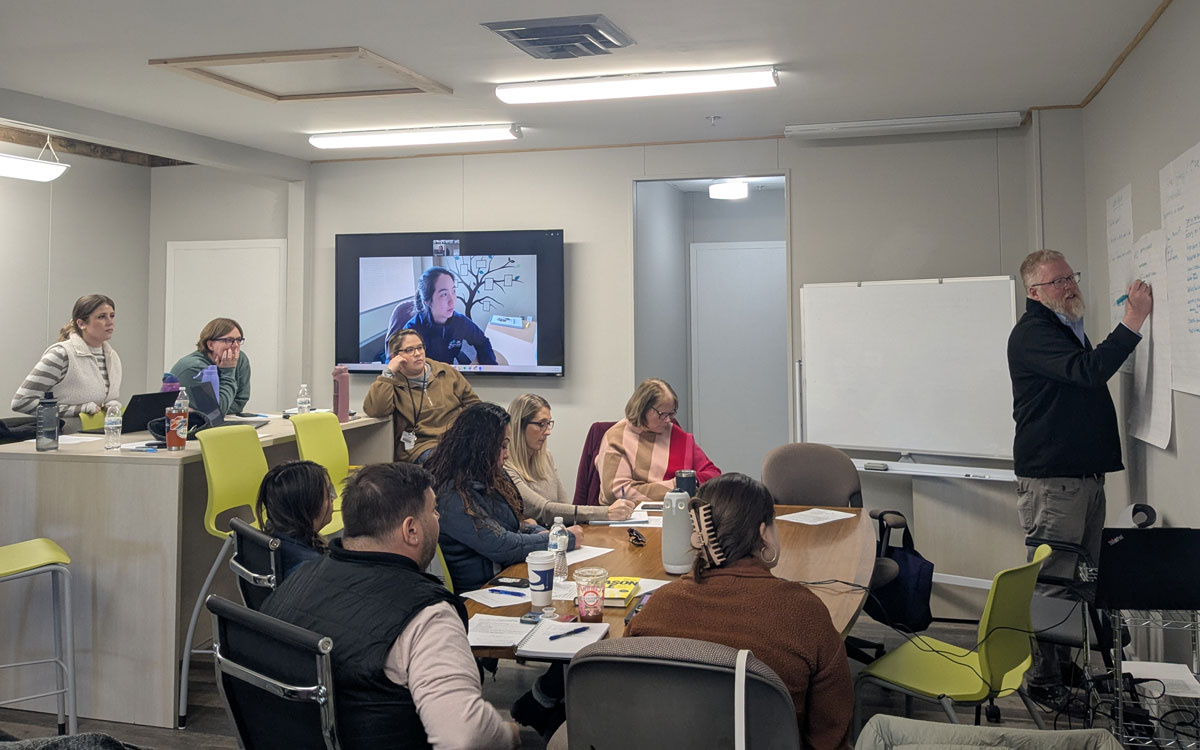By Alba Muñoz Saiz and Ethan Watters
How the Hometown Food Security Project is shaping Austin and Mower County’s vision as a true food destination
On a warm summer evening in Austin, Minnesota, neighbors gathered around tables, not for a meal, but for something just as nourishing: a conversation about food’s power to build community. As they discussed Austin and Mower County’s ambitious 2045 Comprehensive Plan, they were helping shape the Austin–Mower Food System Strategy, an initiative placing food security at the heart of the region’s future.
The conversations ranged far and wide. Local farmers talked about connecting their fresh produce with families who need it most. School administrators shared updates on backpack programs that send meals home with students for weekends. Food pantry volunteers described the faces of neighbors they serve each week. Together, the group imagined a future where every family has easy access to healthy, nourishing food.
Food was the topic at hand, but the real conversation was about building a vibrant, inclusive community where everyone has a seat at the table.

Community members at the Comprehensive Plan 2045 Open House
From Basic Need to Community Vision
For the first time, food takes center stage in Austin and Mower County’s comprehensive planning process. This shift recognizes what many communities are just beginning to understand: food isn’t just a basic necessity; it’s a powerful driver and indicator of community well-being.
The Austin–Mower Food System initiative is organizing its work through “communities of practice” (COP), each focused on a different part of the food system. Some teams concentrate on agriculture, others on distribution or policy. The Access & Equity community of practice ensures the system works for everyone, regardless of income, language or background.
Leading this critical work is the Hometown Food Security Project (HFSP), a coalition of local organizations, which has worked for two years addressing food insecurity and building partnerships across Mower County. The coalition’s co-chair position in Access & Equity reflects both the group’s track record and the trust built among diverse community stakeholders.
Molly Lanke, executive director of United Way of Mower County and HFSP co-lead, agrees that the coalition’s established identity gave the Food System Strategy crucial momentum. “The coalition was a springboard,” she says. “People could see the impact of working together on food security, and imagined what was possible if we expanded that energy into the entire food system.”
Putting Equity into Action
HFSP brings substantial momentum to the Austin–Mower Food System Strategy, built on years of groundwork. The coalition has produced comprehensive food security assessments, launched a mobile app connecting families with local resources, and mobilized hundreds of volunteers to distribute food through innovative programs like mobile pantries.
The Access & Equity team reads like a who’s who of community commitment: advocates from United Way of Mower County, Hormel Foods, CLUES, the Salvation Army, Riverland Community College and Mayo Clinic Health System, alongside community members with lived experience navigating food insecurity. This diverse group works together to reduce barriers and strengthen connections across the entire food system.

Access & Equity Team Meeting
Gema Alvarado-Guerrero, workforce wellness facilitator at Hormel Foods, who serves as HFSP co-lead, sees this collaboration as essential to creating lasting change. “It’s less about one-time events and more about putting systems in place,” she explains. “It’s not as visible as a mobile pantry pulling into town, but it’s just as important. This is the groundwork for lasting change.”
Her perspective reflects a crucial truth about community transformation: “Systemic change happens at the speed of trust. It’s not quick or easy, but it’s the only way lasting change happens.”
Food as Economic Development
The Austin–Mower Food System Strategy isn’t a standalone initiative — it’s one of many pillars in the 2045 Comprehensive Plan, alongside housing, transportation and downtown development, to name a few. Its inclusion signals that food security is just as critical to the region’s long-term prosperity as traditional economic and community development priorities.
Nick Novotny, who leads community engagement for the comprehensive plan at Impact Austin, has watched this perspective shift during his years organizing cultural events and building community connections in southeastern Minnesota. “Food, culture and quality of life are part of economic development now,” he says. “If you don’t have places for people to live and have access to quality food, it’s really hard to attract and keep talent.”
Novotny saw the HFSP’s collaborative framework as a natural foundation for leading the Access & Equity work. “When we began organizing the Austin–Mower Food System initiative into Communities of Practice, HFSP was already five steps ahead,” said Novotny. “They were established, aligned around shared goals and already doing the kind of work the community needed. It perfectly aligns with what we are trying to build here.”

Austin High School students during the Nourishing Champions snack-packing event, fall 2024
Three Priorities for Progress
While still in early stages, the Access & Equity team has identified three initial priorities to guide their work:
-
- Resource Sharing: Families need clear, consistent information about available support — from backpack programs to congregate meals to mobile pantries. The team is streamlining communication channels and reducing duplication so neighbors can easily find what they need.
- Education and Empowerment: Language and cultural barriers shouldn’t prevent anyone from accessing resources. HFSP brings a proven track record in multilingual and culturally affirming outreach, and is now building on that foundation to deepen engagement with all community members.
- Food Sourcing and Distribution: Looking ahead, the team aims to forge stronger connections between local farmers and the distribution networks that serve families facing food insecurity, ensuring fresh, locally grown food becomes the norm rather than a rarity.
“At the end of the day, it’s about making it easier for our neighbors to get what they need,” Novotny says.
From Programs to Systems
HFSP’s impact during its first few years has rippled across the community. Hundreds of volunteers have engaged in service. Tons of food has reached families through mobile pantries. Community events have raised awareness and funds. Training sessions have strengthened local service agencies. These efforts built momentum and gave the coalition a clear identity.
Now, as the Austin–Mower Food System Strategy takes shape, the work is evolving to a broader scale. The same energy that fueled early programs is being channeled into building resilient systems designed to outlast any single organization or initiative.
“The coalition work gave HFSP an identity and brought people to the same table for a shared purpose,” Lanke reflects. “Now it’s about building systems that will outlast us.”
This transition from programs to systems requires patience and persistence — qualities that define the coalition’s approach. The work may be less immediately visible than a mobile pantry arriving in a neighborhood, but its potential for lasting impact is profound.
A Model for the Future
The Austin–Mower Food System Strategy represents a turning point for the area. By weaving food security, equity and local food systems into the comprehensive plan, the community is declaring that access to good food is essential to health and prosperity for all residents.
“The most exciting thing right now is the potential,” Lanke says. “You can see where farmers, schools, nonprofits and businesses will all play a role. It just takes time to build the connections.”
Novotny shares that optimism. “This is bigger than one organization,” he says. “It’s about Austin and Mower County coming together to think about food in a new way. And that has the potential to change everything.”
As the Austin–Mower Food System Strategy continues to develop, it offers a model for communities across the country grappling with similar challenges. The path forward requires collaboration, trust and a willingness to think beyond traditional boundaries. In Austin and Mower County, neighbors are proving that when communities come together around food, they’re really coming together around their shared future.

Hometown Food Security Project
318 Main St N.
Austin, MN 55912
Get Involved!
If you’d like to volunteer with these efforts, let us know on this form.

